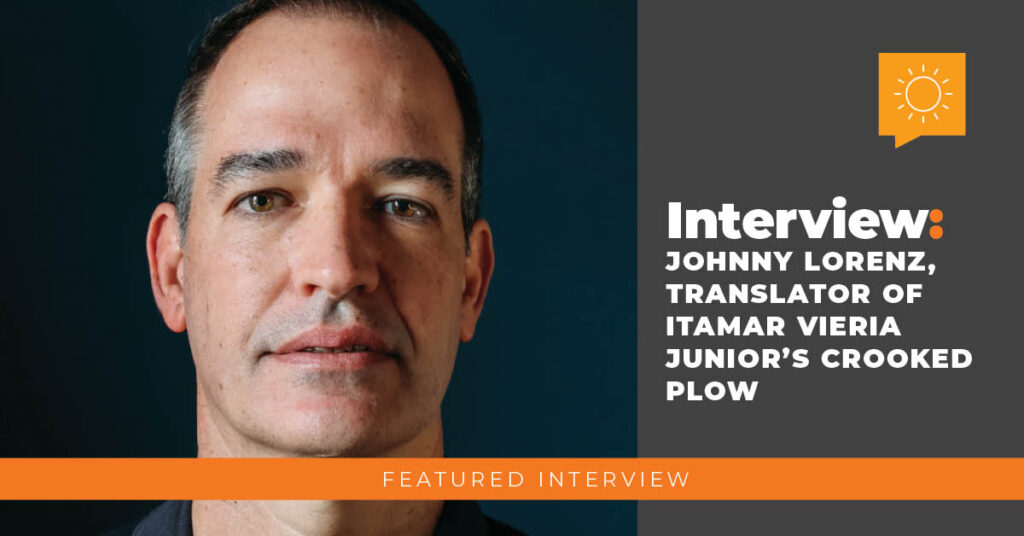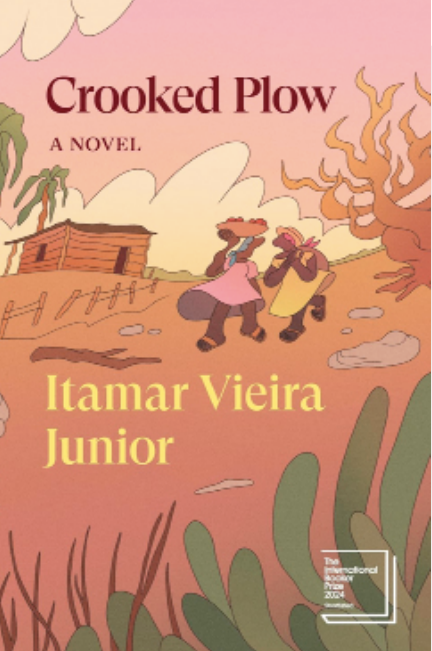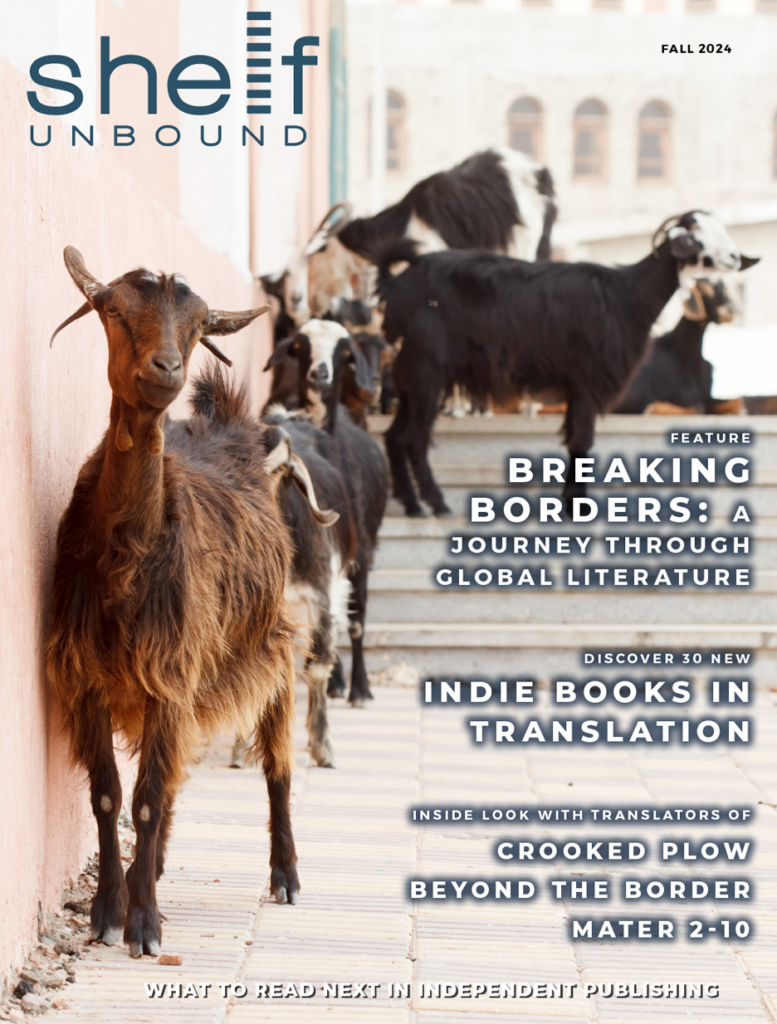By Sarah Kloth

Bringing Crooked Plow to Life in English:
What were the most significant challenges you faced while translating Crooked Plow? How did you navigate the unique cultural and linguistic elements of the Brazilian sertão to ensure that the novel’s essence was preserved in English?
JL: On occasion, the book’s narrators (there are three of them in Crooked Plow) will refer to something – let’s say, a sacred Jarê ritual – that’s not exactly common knowledge for the English-language reader. As the translator, I want the reader to feel included; on the other hand, I don’t want to get bogged down in explanation and thus lose the power, or the sense of immediacy. This is the dance of translation, and every chapter presents the translator with new challenges – sometimes small, sometimes daunting.
Regarding the unique linguistic elements of the Brazilian sertão, sometimes I snuck in just a few “extra” words to give the anglophone reader a way in, but usually I relied on context, hoping that the astute reader would pick up on the meaning of a word. Some words resist easy translation: jirau, compadre. (I enjoy bringing in the sounds of the language when possible – you’ll find these particular words in the original Brazilian Portuguese in my translation.) A word like compadre was a tricky one, actually! I had to develop a whole strategy for that word, a word that invokes a web of social relationships.
Overall, my goal was to keep the texture and the musicality of the original text while intimating to the reader that she is being invited to step into a new world, a world both familiar and strange.
Capturing the Novel’s Unique Voice:
The novel uses a distinct narrative style, blending magic realism with social realism. How did you approach translating this duality? Were there specific passages or elements that were particularly difficult to render in English?
JL: You or I might feel quite comfortable referring to “magical realism” or “social realism,” but for the residents of Água Negra, the rural setting of the novel, these distinctions probably don’t make a whole lot of sense. In the world of Crooked Plow, a knife is a dangerous physical object you can hold in your hand, but an old woman’s curse is just as dangerous! A book communicates a message to the literate, but a candle’s flame (the way it moves or is suddenly extinguished) might also communicate a message to a healer. What’s “real,” we might say, is imagined into existence. Perhaps this sounds like magical thinking, but, of course, even outside of the world of Crooked Plow, most readers would admit that so many things we know are real – love, community, pride, terror, even racism – are things we can’t exactly point to, or see plainly, but they exist.
Cultural Resonance Across Languages:
How do you think the themes of family, spirituality, and social justice in Crooked Plow resonate with audiences outside Brazil? Did you find that certain themes or ideas took on new meanings in translation?
JL: I think the tensions we find in Crooked Plow are tensions we’d recognize in communities outside of Brazil. The tension between educational advancement and family ties, for instance. (In Crooked Plow, Bibiana believes she must abandon her family of farm laborers in order to become educated and fully realized; Belonísia, on the other hand, believes her place is at home, working the land, sewing, cooking). Another tension in the book: the tension between those who can very easily buy property and those who can’t escape profound housing insecurity. Crooked Plow complicates our assumptions about what it means to own the land. The novel also asks some very difficult questions about the relationship between justice and violence.
Depicting Social and Racial Injustice:
The novel explores the lingering effects of slavery and the ongoing struggles of the quilombolas. How did you ensure that these themes were communicated powerfully and effectively in translation? Were there any specific moments that you found particularly impactful?
JL: One of the aspects of Crooked Plow that I find so intriguing and so moving is the way in which the book approaches sacred practices – specifically, the rituals of Jarê, an African Diasporic belief system in the interior of Bahia. I won’t say anything here about the third and final section of the novel, my favorite part of the book, but let me say something about a moment in the first section, the moment when Bibiana hears the words of an encantada, a spirit being, by the name of Santa Rita the Fisherwoman. This ancient entity grabs Bibiana by the arm (we are led to believe this, in any case) and speaks directly to her about her life. The way I understand this moment is that the past is speaking to Bibiana about the future, that Bibiana’s personal struggle has something to do with the community’s larger struggle for the land. When Bibiana refers to herself as a “quilombola,” she is explicitly linking her twentieth-century condition to the condition of those original communities of escaped slaves.
Portraying the Sisters’ Bond:
The relationship between the two sisters, Bibiana and Belonísia, is central to the novel. How did you approach translating the complexity of their bond, especially considering the traumatic event that ties them together?
JL: I don’t know if I had a particular approach to translating the complexity of the sisters’ bond – but I can say this: I tried to remain faithful to the ambiguity of that traumatic event that shapes their lives. The text invites the reader to consider and reconsider that mysterious act of violence, to formulate our own understanding of what actually happened so early in the lives of our protagonists. And the knife that connects their stories – is it an image of oppression, or liberation? Maybe both?
The Role of the Supernatural:
The novel incorporates elements of Afro-Brazilian spirituality and folklore. How did you translate these aspects while preserving their cultural significance and mystical aura?
JL: It was helpful to me to talk to Itamar Vieira Junior about Jarê, and it was also quite illuminating to read Gabriel Banaggia’s ethnographic study As forças do jarê. I’m not exactly sure to what extent this information informed my translation, however, because ultimately I’m not trying to “explain” what happens in a Jarê ritual; I’m trying to bring into English the power and complexity of what’s on the page in the original Portuguese. In fact, one of the beautiful things about these scenes is the degree to which Crooked Plow respects the reader, allowing the reader the opportunity to wrestle with the meaning(s) and truth(s) of a richly textured moment. Sometimes, I feel that translator’s work is to disappear from the scene. But that would be impossible.
Your Approach to Translation:
Could you share a bit about your process when translating a novel as layered and nuanced as Crooked Plow? What steps do you take to immerse yourself in the world of the novel?
JL: I could talk about my process at length – but much of it would bore the reader to tears, I’m afraid! The literary translator’s work is often to agonize over the smallest decisions: should I say that a character “screamed,” or “yelled,” or perhaps “cried out”? Did a character “go crazy” or “lose his mind” or “lose his marbles” or “suffer from delirium”? In any case, let me say a little something about my process: I think a lot about the sounds of syllables, the rhythms of speech. Listening to the page – even if I’m listening in my own mind – is an essential part of the work. I doubt this is unique to myself, but I like to draw attention to this aspect: translators are, ideally, very good listeners. They listen even to the silences.
Collaborating with the Author:
Did you have any direct communication with Itamar Vieira Junior during the translation process? If so, how did that collaboration influence your work?
JL: Oh, yes – Itamar and I had many conversations about Crooked Plow. Before this book, I had translated two novels by Clarice Lispector; I wasn’t able, of course, to ask her any questions – decades ago, she traveled to that distant shore, beyond reach. When I translated Crooked Plow, I suppose I took advantage of Itamar’s presence and his very generous nature. I’d sort of “dork out” on small details regarding the mud houses we find on the plantation in the novel, or the modest, handmade items of furniture, or a coat made from locally sourced leather, or a veil associated with a goddess. I suspect I often wanted to just talk about these things with Itamar – even if our discussions didn’t necessarily inform my translation! I thought I wanted to talk about literary problems, but I suppose I ended up talking about literary pleasures.
Your Connection to the Material:
As a translator, you engage deeply with the text. What aspects of Crooked Plow resonated most with you personally? How did your own experiences or background inform your translation?
JL: My parents are immigrants to the U.S. from Brazil, so it means a lot to me personally to be a part of this project – bringing the powerful story of these two sisters, Bibiana and Belonísia, to an English-speaking public. Crooked Plow is a very important book in Brazil; the book has sold more than 800,000 copies there. Yes, that’s right: 800,000 copies! Or more. An unbelievable number. However, I had already started translating Crooked Plow before it was even published in Brazil. The novel won the prestigious LeYa prize in Portugal, where it would appear first. I read the novel before it traveled back to Brazil, so to speak, and after I read it, I immediately reached out to Itamar. I explained to him that I simply HAD to translate this book! But I had no idea what the book was going to do, what it would become. I translated a few chapters of Crooked Plow and applied for an NEA grant, and while I waited to hear back, the book was exploding in Brazil. As fate would have it, I received good news from the NEA the very same week that Itamar’s novel (Torto arado in Brazilian Portuguese) won the most important literary prize in Brazil, the Jabuti Prize for best novel.
The Importance of Crooked Plow Today:
Crooked Plow has been hailed as one of the most important Brazilian novels of the century. Why do you think this story is so significant in today’s global literary landscape, and what do you hope readers in the English-speaking world take away from it?
JL: I think Brazilians – consciously or not – were aching for a story that springs from the land itself, from the soil of the nation. The book offers a critique of problems that go back to the origin of the nation: slavery and its enduring aftermaths; the unfair distribution of land. Crooked Plow offers a gripping story – a page-turner that I devoured quickly, but I found myself returning to moments and re-experiencing them, re-imagining them. I’ll mention here that part one of the book is told by one sister, and part two is told by the other sister – but I won’t say anything about the third narrator; I’d like readers to experience that wonderful shift in narrative voice for themselves!
The Power of Translation:
In your view, what role does translation play in bridging cultural divides and bringing stories like Crooked Plow to a wider audience? How does this novel contribute to the global conversation about social justice and historical memory?
JL: Literature in translation asks readers to enter worlds that might not be so familiar to them. What a powerful opportunity this is! The American reader will typically read an American novel. We read so little in translation. Are we only interested in ourselves? Reading literature in translation is a chance to expand the self, to question our assumptions. I had the pleasure of visiting a bookstore in Brooklyn with Itamar while he was touring in the U.S., and we chatted about the books on our nightstands. Itamar reads everything! Toni Morrison, Annie Ernaux, Han Kang… but yes, of course he reads everything; a writer, it seems to me, will always want to explore the territory beyond his or her own language.

I heard our grandmother asking what we were doing.’”Say something!” she demanded, threatening to tear out our tongues. Little did she know that one of us was holding her tongue in her hand.’
Deep in Brazil’s neglected Bahia hinterland, two sisters find an ancient knife beneath their grandmother’s bed and, momentarily mystified by its power, decide to taste its metal. The shuddering violence that follows marks their lives and binds them together forever.
Heralded as a new masterpiece, this fascinating and gripping story about the lives of subsistence farmers in Brazil’s poorest region, three generations after the abolition of slavery, is at once fantastic and realist, covering themes of family, spirituality, slavery and its aftermath, and political struggle.

